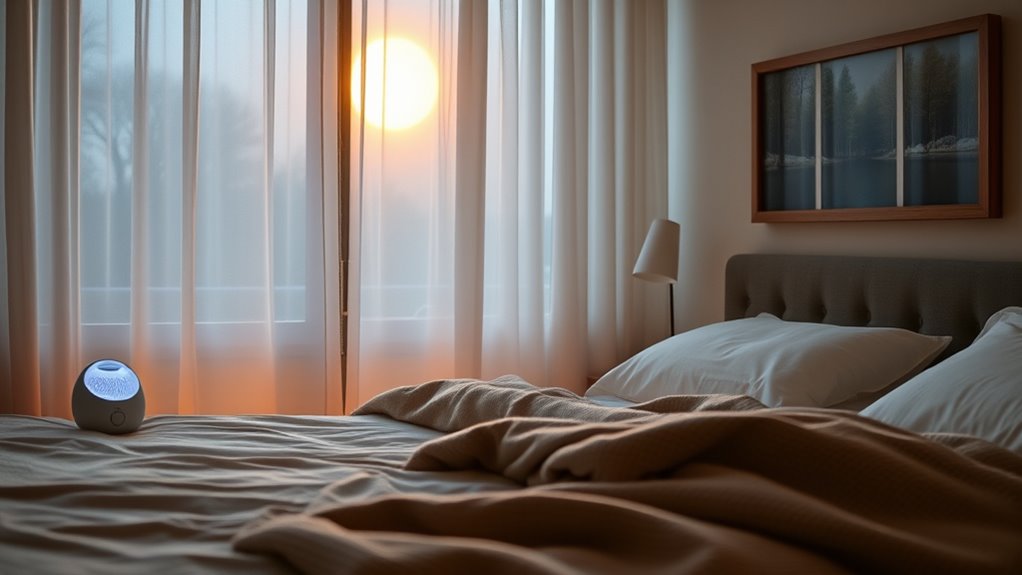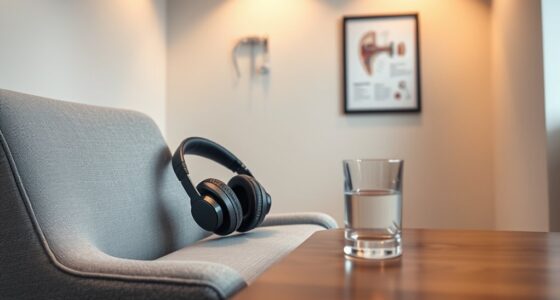To reduce night-time tinnitus distress, create a calming sleep environment by keeping your bedroom cool, dark, and quiet, using blackout curtains, earplugs, or white noise. Establish a consistent bedtime routine with relaxing activities, avoid caffeine or heavy meals before bed, and keep electronic devices out of reach. Maintaining regular sleep schedules and practicing relaxation techniques can also help. Keep exploring tips to make your nights more comfortable and restful.
Key Takeaways
- Maintain a cool, dark, and quiet bedroom using blackout curtains, eye masks, and white noise to minimize tinnitus distractions.
- Establish a consistent bedtime and relaxing pre-sleep routine, such as gentle stretching or listening to calming music.
- Avoid caffeine, nicotine, and heavy meals before bedtime to prevent sleep disruption and tinnitus aggravation.
- Keep electronic devices out of the bedroom to reduce blue light exposure and minimize external noise interference.
- Use relaxation techniques like deep breathing or meditation to signal your body it’s time to wind down and improve sleep quality.

Getting quality sleep is essential for your overall health, and establishing good sleep hygiene is the key to achieving it. One of the most important steps is optimizing your sleep environment. Your bedroom should be a haven for rest—quiet, dark, and cool. Invest in blackout curtains or an eye mask to block out light that can disrupt your sleep cycles. Use earplugs or a white noise machine if external sounds bother you or worsen your tinnitus. Keep the room at a comfortable temperature, generally between 60-67°F (15-19°C), to help your body relax. Removing electronic devices from the bedroom minimizes distractions and reduces blue light exposure, which can interfere with your melatonin production. A clutter-free, calming space signals your brain that it’s time to wind down, fostering better sleep quality. Additionally, practicing relaxation techniques such as meditation or mindfulness can further enhance your ability to fall asleep peacefully.
Alongside creating an ideal sleep environment, developing consistent bedtime routines can considerably improve your sleep quality. Establish a regular schedule by going to bed and waking up at the same time every day, even on weekends. This consistency helps regulate your internal clock, making it easier to fall asleep and wake up feeling refreshed. Before bed, engage in relaxing activities that promote calmness, such as reading a book, gentle stretching, or practicing deep breathing exercises. Avoid stimulating activities like watching intense TV shows or working on stressful tasks, as they can make it harder to wind down. It’s also wise to establish a pre-sleep routine that signals your body it’s time to rest—perhaps taking a warm bath, drinking herbal tea, or listening to soothing music.
Avoid caffeine, nicotine, and heavy meals close to bedtime, as these can interfere with your ability to fall asleep or exacerbate tinnitus symptoms. Instead, opt for a light snack if you’re hungry, and stay hydrated earlier in the day to prevent dehydration during the night. Consistency in your bedtime routines not only helps you fall asleep faster but also reduces night-time awakenings, which can intensify tinnitus distress. Over time, your brain will associate these habits with sleep, making it easier to drift off and stay asleep longer. Remember, your sleep environment and bedtime routines are powerful tools you can control to create a peaceful, restorative sleep experience that minimizes tinnitus symptoms and promotes overall well-being. Incorporating sleep hygiene principles into your nightly routine can significantly enhance your sleep quality and reduce nighttime tinnitus distress.
Frequently Asked Questions
Can Tinnitus Symptoms Worsen With Certain Sleep Positions?
Certain sleep positions can worsen your tinnitus symptoms, especially if your sleep posture puts pressure on your ears or head. Using proper pillow support helps maintain a comfortable position, reducing strain and minimizing noise perception. Try sleeping on your side or back with a supportive pillow to keep your head elevated slightly. Avoid positions that cause discomfort or put direct pressure on your ears, as they might amplify your tinnitus during the night.
Are There Specific Sounds That Help Mask Tinnitus at Night?
You might find that certain sounds help mask your tinnitus at night. White noise is popular because it provides a steady, soothing background that can drown out ringing or buzzing. Nature sounds, like flowing water or gentle rain, also work well to create a calming environment. Experiment with different sounds to see what best distracts you and promotes restful sleep, making tinnitus less noticeable.
How Long Does It Typically Take to See Sleep Improvements?
It usually takes a few days to a couple of weeks to notice sleep improvements after adjusting your sleep environment and prioritizing good sleep duration. Consistently maintaining a dark, quiet, and comfortable space helps your body adapt faster. You might see progress sooner if you stick to a regular sleep schedule and avoid stimulants before bed. Patience is key, as your body needs time to adjust for better sleep quality.
Can Dietary Changes Influence Tinnitus Distress During Sleep?
Dietary changes can influence your tinnitus distress during sleep. Identifying and avoiding dietary triggers like caffeine, alcohol, or high-sodium foods may reduce your symptoms. Nutritional strategies, such as eating a balanced diet rich in magnesium, zinc, and antioxidants, can support ear health and potentially lessen tinnitus severity. By adjusting your diet thoughtfully, you might find it easier to fall asleep and experience less night-time tinnitus discomfort.
Is Medication Effective for Managing Nocturnal Tinnitus?
Medication effectiveness for managing nocturnal tinnitus varies; some find relief with prescribed drugs, but results differ. You should explore alternative treatments like sound therapy or relaxation techniques, which can often be effective without side effects. Always discuss with your healthcare provider before starting any medication or alternative options, ensuring you choose the safest and most effective approach tailored to your needs for nighttime tinnitus relief.
Conclusion
By following these sleep hygiene tips, you can create a calmer bedtime routine and reduce nighttime tinnitus distress. Remember, “A good laugh and a long sleep are the best cures in the doctor’s book.” Prioritize your sleep environment, establish a relaxing pre-sleep routine, and stay consistent. Small changes can make a big difference, helping you wake up feeling more refreshed and less overwhelmed by tinnitus. Sweet dreams start with good habits—so take charge tonight!










